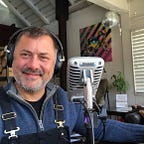On Nature.
Embracing Our Role as Stewards
“I went to the woods, because I wished to live deliberately, to front only the essential facts of life, and see if I could not learn what it had to teach, and not, when I came to die, discover that I had not lived.”
- Henry David Thoreau -
Nature. What does that even mean?
The comedian George Carlin once famously joked that all Mother Nature ever wanted from us was plastic, that its presence on this earth was actually Mother Nature’s deepest desire. According to Carlin, she’s pleased now, even while we bury ourselves in a love/hate relationship with this everlasting stuff. Love may be impermanent, but plastic is forever.
We homo sapiens are nature, not separate, a decent chunk of the biosphere numbering in the billions, and all the technology we’ve built, all the consumer goods and non-perishable items forming landfills and flotillas of debris in our oceans are part and parcel of our evolution. As the futurist Ray Kurzweil suggests, “technology is evolution by other means.” By this, I think he means it’s much faster than genetic mutation and therefore capable of generating extinction events overnight, as well as massive improvements to our biology.
Changes that would have required thousands or millions of generations previously can now happen in one.
Gene therapies and wholesale reinventions of the human genome may be inevitable. Some futurists speculate that our ancestors may fork into divergent species. In this speculative world, people will probably choose prehensile tails, gills or wings. Will most women still carry pregnancies when gestation can happen safely in a lab?
As waste chokes ecosystems with toxins, decimating biodiversity, will people simply engineer themselves to tolerate new environmental pressure? And again, is this “natural?”
No matter how polluted or warm our planet becomes, it’s like that some of us clever and adaptive apes will still be around, even if those remaining immerse themselves in virtual or material luxuries to the point of stagnation.
The truth is, we have transitioned, from living as just another multi-cellular organism at the mercy of natural processes, to increasingly omnipotent stewards of life’s progress. This god-like position is true whether we want that responsibility or not.
Popularly, nature means a lack of the intrusion of human creations.
Why is that so restorative? Is forest bathing actually good for our health?
North of San Francisco, in Point Reyes National Seashore, I get out on a coastal hike or a trail run. Maybe I gear up for a backcountry adventure in California’s Sierra Nevada mountains. Last winter we snowshoed into the Ostrander Ski Hut in Yosemite National Park. With a little effort, paradise is available all around us.
These respites refresh and clear our minds, bestows inspiration and rekindle creativity. The effort required offers exercise and good health. We sweat and feel the limits of our lungs, heart and legs. The vistas kick whatever primordial part of our guts and heads that release oxytocin or dopamine and we’re euphoric.
When I’m out on a trail, my daughter on my back, sometimes walking herself, makes thousands of discoveries, pebbles, shells, salamanders, leaves, astringent crushed bay leaves, eucalyptus and the licorice smell of wild anise. We play, laugh, picnic and sometimes are bitten by ticks. Removing these is a careful little surgery we can do together. Occasionally she just runs in circles squealing with a friend’s child along the way. I feel closer to my fellow hikers. My friends and I share the conversations that matter and the silences that can matter even more.
The richness of this inspiration, the breadth of this elation is fading, dying by a thousand cuts, as so many species die out. A million poets, artists, authors and musicians have sung about this once infinite wellspring, but it feels possible that we may be close to the last generation to do so.
If the natural world withers to remote corners of the globe, people will become entombed only in the inventions of our narrow human perspectives. The scope of human imagination will be impoverished, possibilities murdered. Whether today or in some dystopian future, those deprived of respites from the narrow scope of human creations have limited their own inspiration.
Wilderness has exponentially more inventions than we do. Evolutionary biology has a 3.5 billion year head start.
The good news is that Nature Deficit Disorder is not inevitable, for any of us. With a little effort, a regular inoculation granted in the woods, by the sea or ranging in the mountains, we each can live our larger worlds and our larger selves. From such vantages we see the value in preserving huge tracts of evolutionary legacy still somewhat unchanged by human preferences.
